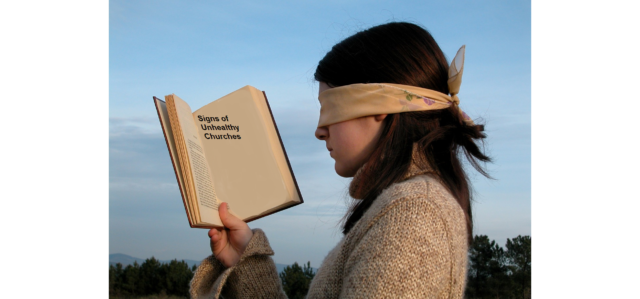As stated before, I was a sensitive child. I grew into a sensitive teen, who became a sensitive adult. The age-old question arises, was it nature or nurture? Was it biology, or environment? Obviously, it is impossible to decipher. Regardless of the cause, I was sensitive. That meant that I was quicker to respond to the slightest pressure, as well as being deeply affected by everything that was said to me. I was highly conscientious, and hyper-aware of disapproval. At an early age, I learned to read expressions. A raised eyebrow or dirty look was as potent to me as if words had been spoken over me. Many people raised in abusive environments have this trait as adults. It comes from a shame-based upbringing, where fear is palpable.
I’ve written past articles about how I was trained to sit on the front row in church by myself at nine months old. In the moments where I had trouble managing that, I was taken out and spanked…thus, instilling in me from an early age a sense of shame. To be sure, the entire environment of the cult is drenched in shame. It functions on shaming the subservient population so that they will give more power to the ruling class. In this case, the congregants are the subservient ones, while the pastors are the elite.
Shame was also prominent at home. Because of the nature of being a preacher’s daughter, we didn’t just go to church a couple times of week and then go about our normal lives. Church was our normal life, and every day revolved around our ‘relationship with God,’ and our ‘service to God.’ As a result, anything you did at home that was remotely ‘sinful’ received a message of shame. For example, normal developmental stages of childhood include such behaviors as lying to get out of trouble, sometimes lying because you don’t even realize it is a lie, taking things that don’t belong to you, etc. These are behaviors related to learning the boundaries of one’s environment. Yet, reacting with anger when you were told no, or when people invaded your instinctive boundaries was also ‘sinful.’ All of these things were not only punished with a spanking, but also involved a sermon about what God thought about it.
Shame, shame, shame on you! So, not only would you get a spanking for stomping your foot and screaming, when you were two years old, but you would also be told that God was not pleased with your anger, and you would have prayer. You would be led through a prayer of repentance to help you start to understand that God was displeased with your actions as well. When I received a spanking for anything, even fighting with my sister, there was prayer afterward, to “get right with God.”
As an adult educated about child development and human nature, as well as boundaries, I realize that many of those things were not even remotely sinful, but were my instinctive reactions to being manipulated and controlled. While on the surface this might seem to be a good way to raise kids, every little mistake became a spiritual issue. You were lost eternally if you told a lie or showed anger toward your parents. This created in me a sense that every moment I could be ‘falling into sin.’ As a human being, there seldom was a day that went by, in certain stages of childhood, where I didn’t do something that could be deemed a ‘sin’
Clinical observations: Imagine the shame and the guilt of a child who really wants to please God, but finds herself continually failing. The anxiety and panic of somehow failing to be perfect can be overwhelming. Gradually, in such an environment, you become ashamed of your own feelings, so you try to numb them. Stuffing those feelings inside creates a low level of depression clinically termed “dysthymia.” At the root of most anxiety is this deep sense of shame. In the case of this example, you are constantly anxious that you are displeasing to God, that you are not measuring up to your own expectations, and that you are somehow continually missing the mark. Shame is different than guilt. We all feel guilty when we do something wrong. This is a natural feeling that leads us to repentance, change, or reflection. Shame is different. Shame is there because we are a general failure in our own minds. Shame is there because we do not measure up, either to our own standards or to those of others. Shame is not just felt in a moment, concerning one action, but permeates our lives.
As I grew into a teenager, I learned to feel shame about other things in my life. (For example, as humans grow into the teen years, it is normal to have hormones and to begin to feel sexual attraction. The bodies begin to change, and secondary sexual attributes become apparent.) For a girl raised in this cult environment, there’s a lot of shame attached to these developments. Of course, every human being knows about sexual development, and hormones. However, in the cult environment, by its very nature of listing rules and regulations, the female body becomes a shameful thing. I am not trying to be crude, but girls with natural curves may especially feel a sense of shame attached to their bodies, because the cult ‘rules’ teach females to hide their bodies ‘to avoid others lusting.’ This teaches girls that they are responsible for the thoughts, and even sins of others. What a shame!
Over-sexualizing the human body causes a lot of shame, and even some twisted thinking. I remember a young man who was always correcting a couple of young ladies in the church. He kept coming up to them and telling them that their skirts were too tight, or that their tops were too tight. Finally, my dad addressed this with him, and told him “If they’re not dressed right I will correct it, as the pastor.” He said “It’s not your place to go around correcting women in the church.” He then found out that the young man was feeling sexually attracted to these girls, and that’s why he was finding fault with them. The problem really was not with the young ladies, but with his own natural attraction to the opposite sex. (From the viewpoint of mental health, looking at nature and hormonal influences, even he was not at fault…he was made to feel guilty for something that was quite natural.)
I remember once, around the age of fifteen, feeling ‘convicted’ because of a beautiful dress that I had bought, and loved dearly. It looked so pretty, and it was my favorite dress. However, I became aware of a teenage boy looking at my breasts when I was wearing the dress, I felt that I was being ‘sinful’ to wear a dress that was ‘fitted.’ Granted, I was a little more ‘blessed’ than some of the other girls, just by genetics. Because of this, pretty much anything I wore was not going to hide my body, unless I wore a feed sack.
Yet, in retrospect, I was not the only girl so affected. A friend of mine in the cult, who was extremely sensitive as well, wore loose jackets all of the time, and would never wear a dress with a bodice. Everything was always very baggy, and she looked pretty tacky on purpose. She also walked stoop shouldered to hide her figure. Her body shame was caused by not wanting to be the ’cause’ for a man to sin with lustful thoughts. She also told me, at one point, that she would never wear anything but plain cotton underwear, because anything else made her ‘have bad thoughts.’ She was a teen girl with hormones and body development given by God. What a shame that she carried around such needless shame!
The shame in the cult never ends. You are shameful because you fail, you are shameful because you are a sexual creature, and you are a shame because the opposite sex is attracted to you. Shame on them as well! How dare they notice that you are female with curves!
Clinical observation: Now that I have studied human development, I realize that all of these things are very normal and not sinful at all. It is very normal for a young male to be attracted to a young female, even noticing her body traits. It is very normal and natural for all young people to occasionally have ‘dirty’ thoughts. These things are not shameful, but are part of the human existence that God created to drive procreation and families. Obviously, people have to learn to curb impulses, but as far as being ashamed of one’s thoughts or hormonal reactions, it is ridiculous to heap this kind of shame on people.
When I was engaged to my first husband, I was still part of this cult. He was very conservative, an ordained minister in the same cult. I remember telling him as we became engaged to “just let me know” if he had any “holiness standards” that we didn’t have, and I would change my dress or behavior to what he preached. He declared that there was nothing like that at all. A month or so later, his parents came to visit, his mother with her scarf around her neck like a turtle neck…and all of a sudden I got a phone call from him, commenting that my necklines were too low. I was frustrated, because I worked very hard to follow all of the modesty ‘rules.’
We spoke at length about this, and he described to me different dresses that I wore where he had noticed that my necklines were too low. I tried on those dresses, bending down in front of the mirror and even bending down in front of my parents to see if they could see anything. They couldn’t. I called him back, trying to figure out what in the world he was talking about. He told me that he saw too much of my neck and it made his mind wander to other areas. We were engaged to be married in two months! He was sexually attracted to me, as hopefully most engaged young men are to their fiances. There is nothing wrong with this, but he felt shame, which he then tried to project onto me, as causing him to have ‘sinful thoughts.’
After we were married, he would criticize practically everything I put on. Finally, frustrated at the guessing game, I asked him one day to just give me a place on my body where he wanted my necklines to be, and I would make sure that they were always there. He told me that my collarbones needed to be covered up, because the base of the neck was very sexual, and caused men to think about other parts that were covered.
As you can imagine, the entire marriage was drenched in shame. (In retrospect, I realize that he had also been soaked in shame growing up, and that ‘shame’ had basically become his middle name.) However, at the time, I only knew that I received constant messages of shame. If I did not want to have sexual relations with him some night, and he wanted it, then I needed to “submit to him as the Bible said.” If I asked him more than a couple of times to change a light bulb, I was a “nagging wife,” and the Bible talked about those! I was not to disagree with him about anything, because the Bible said to submit to your husband. If he wanted one of the children spanked, even for age-appropriate behaviors, I had to spank them, regardless of my personal feelings about the matter. This not only invaded my boundaries, but caused me to go against my very own conscience. However, it was a shame to have my own thoughts, it was a shame to defy my husband, and it was especially a shame, since he was my pastor, to disagree with him.
Of course, we began raising our children in a constant shower of shame. Early on, he had the three-year-old and five-year-old in their room, giving them a message about hell fire….describing in very explicit sermon terms what hell is like, and telling them over and over “You’re going there. You’re going there. I can’t save you.” All of this happened because they lied. (Now if you know anything about child development, you know that it is very normal for three-year-old and a five-year-old to lie. A three-year-old and a five-year-old may not even be aware that they’re telling a lie, they’re just responding instinctively.) Even though I was horrified at his terrorizing the children, I could not intervene at that time, because of my own deep sense of shame. He was their pastor, he was their father, while I was merely his wife, and was supposed to be submitted to him. Even though I stood in the other room horrified, and crying for the terror my children must be feeling, I did nothing. Shame on me!
During this time, I remember specifically working on my own attitude, because of the resentment and disagreement I felt at the continual abuse and shame that was occurring in our home. I engaged in a daily Bible study about all the verses concerning ‘submission’ and daily repentance for my inner thoughts that were anything but submissive. I prayed for him to change, to be a good father, to be a kind husband, but I really felt so much shame regarding my lack of agreement with his behavior, and that was the main focus of my devotionals during that time. Some very difficult things happened in our lives right after that, and we ended up abruptly moving.
He had admitted viewing pornography, years earlier, and he felt deep shame, but eventually shifted to shaming me for “not forgiving” him when I had difficulty trusting him alone with the computer. He would be gone at weird hours of the morning and night, often leaving as I was putting the children to bed and not returning until three or four am. He would tell me that he was at the church “studying” or “preparing his radio broadcast.” I only knew that there was no computer in our home, but in his church office instead. I had difficulty trusting that his spirituality was so thick during those hours, because his abuse of the family daily grew worse, and his behavior with me was deeply hurtful.
Eventually, when I realized the children were in serious danger, I left. I had been deeply concerned about one of our children, who had suddenly begun to hoard things, as well as obsessively washing his hands every few minutes. Both of our older children had recently regressed to urinating and defecating in their clothing, after being fully potty trained years earlier. I felt that my children were not going to survive the abuse unscathed, and my first responsibility was to save my children. While debating and praying about what to do, I found another twist. I discovered this ‘godly man’ involved in sexual abuse of our children. I caught him having one of them touch him sexually. They were innocent, and I was their guardian. I made my plans to leave, and carried them out. It was a logical decision, because I realized even then that I was going to lose everything to shame. My life as I knew it ended the moment I chose the children over a “man of god“.
It was worse than I had imagined, though, because he then contacted other conservative preachers, and asked them to contact my father. They proposed to have a meeting, where they would command me as ministers of God to go back to my husband and submit to him. My dad refused to have me endure that treatment, since he had personally witnessed results of beatings my husband had given our children, including one time when he whipped our toddler with a belt while he was naked, (causing him 30 minutes of screaming due to the belt hitting sensitive male parts).
Though I’m thankful for my dad’s protection in that matter, shame was heaped upon me. My ex continued to preach and be promoted even more with the endorsement of ‘big-name’ preachers within the cult, even when he ended up divorced, with only supervised visitation. Meanwhile, I was reported to have been “crazy,” “ungodly,” and a “liar,” an “instrument of Satan used to try to destroy a man of God.” I was shamed again, and it was almost more than I could bear. There was no room in the cult for a ‘divorcee’ (which was a term said in a whisper, as if it was a bad word). An ex-wife to a preacher was even more unheard of! What a shame! I was left in disgrace, trying to find my way alone, slogging through the marsh of shame. Still, I stayed in the cult.
Note: This post is one of the most difficult I have ever written. There will be sequels in time. Writing about this is deeply cathartic, but also extremely intimate. Shame has affected my life permanently and there is so much more to tell about the scars it has left. Yet today I am aware of its existence. Due to the Grace I have found in Jesus Christ, I am no longer a slave to shame. I am a child of God. He bears my shame, and he knows me by name. Every day is a little brighter since I realized he is not, and never was the author of shame!












